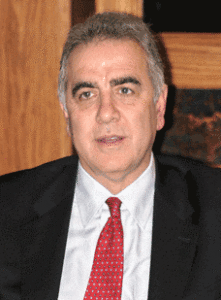A colloquium was held on February 27, 2018, at the European Parliament in Brussels on the legal right of self-determination for Nagorno-Karabagh (Artsakh). It was hosted by European Parliament deputies Michèle Rivasi (Verts/A LE) and Lars Adaktusson (EPP); and co-organized by the Armenian Legal Center for Justice and Human Rights, Tufenkian Foundation, and the European Armenian Federation for Justice and Democracy.
The speakers at the colloquium were: Dr. Alfred de Zayas, a UN Independent Expert on the promotion of a democratic and equitable international order; Dr. Paul Williams, Professor of Law, American University Washington College of Law and co-founder of Public International Law & Policy Group; Dr. Sergey Markedonov, Associate Professor at Russian State University; Armine Aleksanyan, Deputy Foreign Minister of Artsakh Republic; and moderator Giro Manoyan, Board Member of the Armenian Legal Center for Justice and Human Rights.
Prof. Alfred de Zayas started his legal argument by quoting from the International Covenant on Civil and Political Rights and the Covenant on Economic, Social and Cultural Rights which stipulate that “All peoples have the right of self-determination.”
Furthermore, international legal expert de Zayas emphasized that according to the two UN Covenants, “duty bearers of the right of self-determination are all States parties to the Covenants, who are not merely prohibited from interfering with the exercise of the right, but ‘shall promote’ its realization proactively…. They must not only respect the right, but implement it. Moreover in modern international law, self-determination is an erga omnes [towards everyone] commitment stipulated in numerous articles of the UN Charter and in countless Security Council and General Assembly resolutions. The empowerment of peoples to enjoy human rights without discrimination and to exercise a degree of self-government is crucial for national and international stability. Otherwise, a significant potential for conflict remains.”
Significantly, Prof. de Zayas stressed: “Even though self-determination has emerged as a jus cogens [compelling law] right, superior to many other international law principles, including territorial integrity, it is not self-executing.” Among “legitimate claimants to the right of self-determination,” Prof. de Zayas included the Kurds, Sahraouis, Palestinians, Kashmiris, Igbos of Biafra, and Tamils of Sri Lanka. He also mentioned as examples “the Russian-Ukrainian entities of Lugansk and Donetsk, the Republic of Pridnestronia (Transnistria-Moldavia), the Republic of Artsakh (Nagorno Karabagh), Alkhazia, and Southern Ossetia… among peoples that have achieved self-determination through effective separation from State entities with which they had hitherto been associated, but their international status remains inchoate because of the political bickering among the great powers and consequent lack of international recognition.”
Prof. de Zayas added that people seeking self-determination “are entitled to the full protection of the International human rights treaty regime. A solution to the impasse can only be through peaceful negotiation, since the use of armed force against self-determination would violate numerous international treaties, including the UN Charter, the human rights Covenants, and the Geneva Red Cross Conventions.”
“If there is a compelling demand for separation,” de Zayas insisted, “it is most important to avoid the use of force, which would endanger local, regional and international stability and further erode the enjoyment of other human rights.” In addition, “The implementation of self-determination is not exclusively within the domestic jurisdiction of the State concerned, but is a legitimate concern of the international community.”
Prof. de Zayas explained that the principal of territorial integrity is only valid in the case of an external attack: “The principle is not intended for internal application, because this would automatically cancel out the jus cogens [compelling law] right of self-determination. Every single exercise of the right of self-determination that results in secession has entailed an adjustment to the territorial integrity of the previous State entity. There are too many precedents to count.”
There should be no discrimination among people who seek self-determination, according to Prof. de Zayas: “The independence of the former Soviet republics and the secession of the peoples of the former Yugoslavia created important precedents for the implementation of self-determination. These precedents cannot be ignored when modern self-determination disputes arise. It is not possible to say yes to the self-determination of Estonia, Latvia, Lithuania, Slovenia, Croatia, Bosnia and Herzegovina, Kosovo, but then say no to the self-determination of the people of Abkhazia, Southern Ossetia or Nagorno Karabagh. All these peoples have the same human rights and must not be discriminated against. As in the case of the successful claimants, these peoples also unilaterally declared independence. There is no justification whatever to deny them recognition by applying self-determination selectively and making frivolous distinctions that have no base in law or justice.”
For those who juxtapose the principle of territorial integrity to self-determination, Prof. de Zayas countered: “The principle of territorial integrity is not sufficient justification to perpetuate situations of internal conflict that may fester and erupt in civil war, thus threatening regional and international peace and security.”
Finally, Prof. de Zayas suggested that “In order to ensure sustainable internal and external peace in the twenty-first century, the international community must react to early warning signs and establish conflict-prevention mechanisms. Facilitating dialog between peoples and organizing referenda in a timely fashion are tools to ensure the peaceful evolution of national and international relations. Inclusion of all stakeholders must be the rule, not the exception. In conclusion, let us celebrate the implementation of self-determination of peoples as an expression of democracy, as indeed democracy is a form of self-determination.”







